Are you running a small business and dreading tax season? You’re not alone. However, with the right help and tools, you can file your own taxes with confidence. This will not only save you money but also give you a better understanding of your finances. This article will walk you through preparing, filing your taxes, and what forms you’ll need. We’ll also emphasize the importance of deadlines.
Ever thought you could manage your own taxes? Or wondered if it’s really beneficial? This piece will show you all the tips, tools, and resources you need. With them, you’ll be able to manage your business’s taxes yourself. There’s no need to let fear stop you from achieving your business’s financial success.

Key Takeaways
- By understanding different ways to prepare and file your taxes, you can choose the approach that suits your business structure and needs.
- Collecting and organizing your business records is a crucial first step in the tax filing process.
- Always use the correct tax forms for your business structure and take advantage of tax software designed for small businesses.
- Accurate and thorough completion of tax forms is essential to avoid penalties and ensure compliance.
- Being aware of tax deadlines and planning ahead can help you stay organized and avoid unnecessary stress.
Understand Different Ways to Prepare and File Your Taxes
Filing taxes for your small business is key. You must know the different ways to do this. The method depends on your business type.
Sole proprietors and single-member LLCs use a form called Schedule C. This reports your business’s income and expenses on your personal tax return. It mixes your business info with your personal tax details. This simplifies the filing process and makes sure your small business taxes are correct.
“Preparing and filing your taxes can be a seamless experience if you approach it the right way.”
If you have a corporation or a multi-member LLC, things are different. You’ll have to file separate corporate tax returns. You should use forms like Form 1120 or 1120S to report your income and expenses. Knowing which form fits your business is vital for accurate taxes.
Self-employed folks can deduct specific business expenses. Tracking and sorting your expenses can reduce how much tax you owe. This lowers your overall tax bill.
Here’s a table that shows how to prepare and file taxes for small businesses:
| Business Type | Preparation Method | Form(s) Used |
|---|---|---|
| Sole Proprietorship | Report business income and expenses on personal income tax return | Schedule C |
| Single-member LLC | Report business income and expenses on personal income tax return | Schedule C |
| Corporation | Prepare separate corporate tax return | Form 1120 |
| Multi-member LLC | Prepare separate corporate tax return | Form 1120S |
Knowing the best way to prepare and file your taxes can ease the process. By choosing the right method for your business and using certain tax deductions, you can file your taxes accurately and might even lower your tax bill.
https://www.youtube.com/watch?v=z3oRvsewlyM
Collect Your Business Records
Before you start on your business tax return, make sure to gather all your records. These detailed records let you claim deductions and report income the right way. Whether your records are on paper or digital, being organized all year makes tax time easier.
Here’s what you should collect:
- Invoices and receipts: Store all proof of business expenses, including invoices and receipts for all transactions.
- Bank statements: Keep bank statements to help account for your income and manage your business funds properly.
- Payroll records: For businesses with employees, maintain details of wages, taxes withheld, and other payroll matters.
- Business contracts and agreements: Keep copies of all contracts and agreements related to your business activities.
- Mileage logs: If you drive for business, maintain a log of your mileage to claim the right deductions.
Using accounting software or spreadsheets makes managing records easier. These systems let you track transactions, create reports, and enter data into your tax return. This reduces mistakes and boosts efficiency.
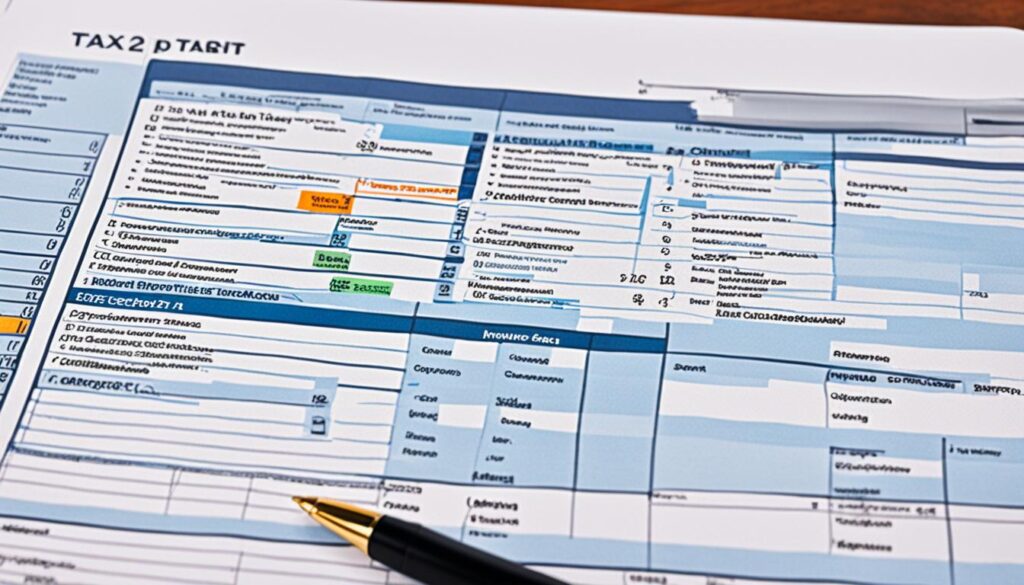
Find the Right Tax Form
Filing your taxes correctly needs the right form. Your business type decides the form you’ll use. Sole proprietors and single-member LLCs use Schedule C. This makes including business income and expenses in your personal tax simple.
Corporations and multi-member LLCs file separate corporate returns. You might need Form 1120 or Form 1120S based on your business. These forms ask for more detailed business info. Make sure you know what’s needed.
There’s tax software for small businesses now. It makes filing easier, saves time, and lowers error risk. Pick software made for small businesses. It should have features that meet your specific needs.
Benefits of Using Tax Software for Small Businesses
Tax software for small businesses offers big benefits:
- Ease of use: It’s made to be simple, guiding you at each step.
- Automation: It fills forms and does calculations on its own, cutting down mistakes.
- Accuracy: No manual data entry means fewer errors in your return.
- Record keeping: It comes with tools to help track your expenses all year.
Tax Planning for Startups
Startups should also think about tax planning. It helps make smart decisions to lower your taxes. Look at your income, expenses, and business setup to find deductions and tax perks.
“Effective tax planning can play a vital role in optimizing your business’s financial health and ensuring compliance with tax laws.”
Tax planning for startups includes:
- Finding tax credits and deductions
- Setting up your business to be tax-efficient
- Keeping track of tax duties and deadlines
- Getting advice from a tax pro on complex rules
Choosing the right tax form and doing tax planning helps your business. It makes the tax process smoother and ensures you use all possible deductions and credits.
| Tax Form | Business Structure |
|---|---|
| Schedule C | Sole proprietors and single-member LLCs |
| Form 1120 or 1120S | Corporations and multi-member LLCs |
Fill Out the Form
Getting the right form is the first step. Make sure you fill it out carefully to file your business taxes smoothly. Different businesses use different forms. For instance, sole proprietors and single-member LLCs often use Schedule C. This form asks for business income and expenses. (tax tips for entrepreneurs)
Corporations and multi-member LLCs, meanwhile, have different needs. They might fill out Form 1120 or 1120S. These forms need more detailed info about your business. It’s crucial to follow each form’s instructions carefully to avoid problems. (business tax filing)
Using tax software can make things much easier. It can guide you through filling out forms with built-in prompts. Also, getting advice from a tax pro ensures everything is done right. They can also help you find all the deductions you’re eligible for. (tax tips for entrepreneurs)
Sample Schedule C
| Line Number | Description |
|---|---|
| 1 | Gross Receipts or Sales |
| 2 | Returns and Allowances |
| 3 | Cost of Goods Sold |
| 4 | Gross Profit |
| … | … |
Note: The table above shows parts of Schedule C. Always use the official instructions to fill it out based on your business’s real finances.
By filling out forms correctly, you ensure accurate tax filing for your business. This avoids trouble with the IRS and keeps clear financial records. Always keep copies of all forms and documents. (business tax filing)
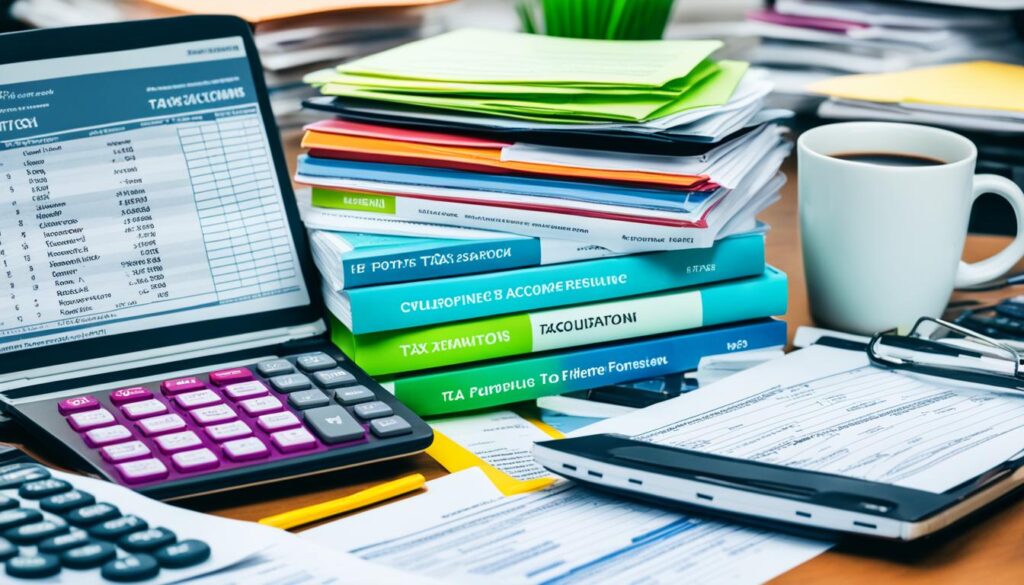
Now, let’s focus on the importance of tax filing deadlines. Meeting these dates prevents penalties and keeps you in line with tax laws. (tax tips for entrepreneurs)
Pay Attention to Deadlines
Meeting your business taxes’ deadlines is key. Not filing on time can lead to penalties and more costs. It’s vital to know your business’s tax deadlines to avoid these issues.
For sole proprietors and single-member LLCs, you usually have until April 15. This time allows you to prepare your tax return properly. The deadline might change if the 15th is on a weekend or holiday.
But, corporations and multi-member LLCs have different deadlines. Your filing date depends on your business structure. Check the IRS guidelines or get professional help to find your exact deadline.
Startups need to be extra careful about tax planning and deadlines. Good tax planning is essential for new businesses. Hiring a tax expert can help startups stay on track with taxes.
Penalties for Late Filing
Missing your tax deadline can hurt your business. The IRS can charge you a fee based on what you owe. This can add up and become very expensive over time.
On top of penalties, unpaid taxes will gain interest. This interest piles up until you pay off the total amount. You can avoid these extra costs by filing your taxes on time.
Developing a Tax Calendar
Creating a tax calendar is a great way to stay on schedule. It lists all important tax dates for the year. It reminds you of tax payments and filing dates.
Having a tax calendar helps you organize and focus on your taxes. To prevent stress and mistakes, make one using digital tools or even pen and paper.
Your Tax Deadline Checklist
Here is a checklist to keep you ready for tax deadlines:
- Put the tax deadline in your calendar or set a reminder early.
- Collect all documents you need for your tax return.
- Check your tax forms carefully for any errors.
- If meeting the deadline seems tough, you might file for an extension. But remember, the extension doesn’t apply to the taxes you owe.
- Setting up a payment plan with the IRS is an option if you can’t pay all at once. This can help avoid extra penalties.
Taking tax deadlines seriously is crucial. Staying informed and ready can help you manage your tax duties smoothly.
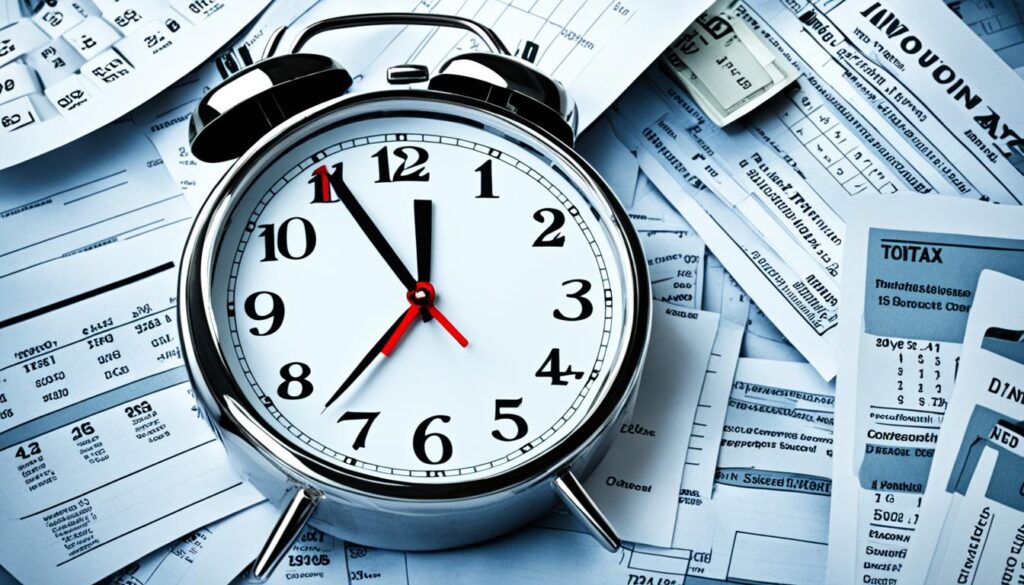
Consider Using Tax Software or Hiring a Professional
Handling your own business tax filings is doable. But it can be smart to use tax software for small businesses or get help from a tax pro. This is especially true if your business structure is complex or you’re not too familiar with tax laws. Good tax software can make things simpler. It walks you through each step and makes sure the numbers add up. This saves you time and lowers the chance of making mistakes.
Tax Software for Small Businesses: Using tax software designed for small businesses can make tax prep easier. These tools are easy to use. You can add your financial info and go through the sections that matter to small businesses. They do the math for you and check for any mistakes. This way, your tax return is more likely to be right.
Hiring a Tax Expert: If taxes get too tricky, or you’d rather have a pro handle it, hiring a tax expert can help. They know a lot about tax laws and can give advice to save you money on taxes. They can also be a big help if you’re audited or have questions from the IRS. This means less stress for you.
Whether you use tax software or hire a pro, both can smooth out the tax filing process. They might even find deductions you missed. Choose what works best for your business to make sure you file correctly and on time.
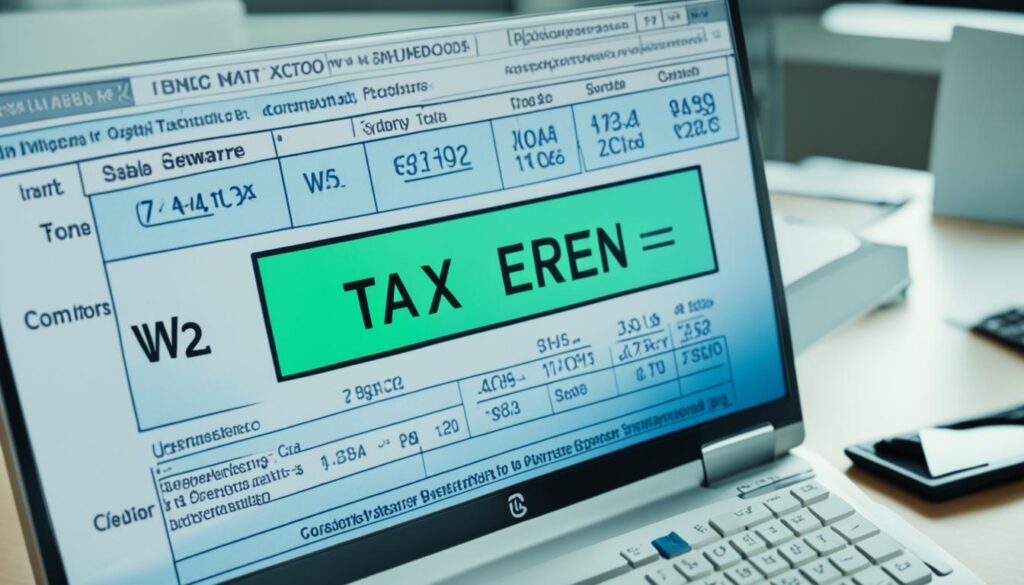
Save Money for Taxes and Understand Tax Deductions
It’s key for small business owners to plan and manage their money well. Doing this helps lower your tax bill. Here, we’ll cover some ways to save and stay financially healthy.
1. Pay Estimated Taxes Quarterly
Paying estimated taxes every three months is smart. It spreads out the payments, easing your budget. Make sure to calculate these payments correctly, either with a tax pro or software.
2. Familiarize Yourself with Self-Employed Tax Deductions
Learn about the tax deductions for the self-employed. They can cut your taxable income and taxes. For example, you have:
| Tax Deduction | Description |
|---|---|
| Startup Costs | Deduct expenses related to setting up your business, such as legal fees, marketing costs, and professional fees. |
| Raw Materials | Claim deductions for the cost of raw materials used in your products or services. |
| Office Supplies | Deduct expenses for office supplies, including stationery, printer ink, and postage. |
| Home Office Expenses | Claim deductions for a portion of your home-related expenses, such as rent, mortgage interest, utilities, and maintenance costs. |
| Insurance Premiums | Deduct insurance premiums for policies that are directly related to your business. |
Many other deductions exist. A tax pro can help you find all that apply to you.

3. Keep Accurate Records and Track Expenses
Good records are vital for deductions. Keep all receipts, invoices, and statements organized. Use software or a bookkeeper to stay on track. This makes deductions easier and supports your claims if audited.
4. Consult with a Tax Professional
Tax laws are tricky. A pro can ensure you get every deduction possible. They’ll also help avoid mistakes and audits. It’s a smart move for any small business or self-employed person.
Stay ahead with these tax tips. They’ll help you save and make the most of deductions. Always check with a tax pro or software to stay within the law.
Keep Accurate Records and Stay Organized
To manage your business expenses and keep good books for taxes, it’s vital to keep neat records and be organized. This way, you can easily claim deductions, report your finances honestly, and avoid problems with the IRS.
Here’s how to keep your records straight and make bookkeeping easier:
Create a System for Recording Transactions
Find a reliable way to record all your business dealings. Use accounting software or a manual spreadsheet. Log every expense and income.
This gives you a clear view of your finances and makes tax time easy.
Reconcile Your Books with Bank Statements
Match your financial records with your bank statements regularly. Do this monthly or quarterly. It helps you find and fix mistakes quickly. This keeps your reports accurate and avoids tax filing problems.
Produce Complete and Detailed Financial Statements
Create detailed financial statements like income statements and balance sheets. They show how your business is doing financially. These reports are vital for taxes and show the IRS your finances are correct.
Organize and Retain Receipts and Invoices
Store all your business receipts and invoices carefully and clearly. Keep them safe but easy to find. They are important if you’re audited and prove your expenses are legitimate. Good documentation is crucial for tax bookkeeping.
Utilize Accounting Software or Professional Bookkeeping Services
Think about using accounting software to make bookkeeping smoother. It can save you time and lessen mistakes. Or, hire a bookkeeping service to ensure your records are correct and meet tax rules.
“Keeping detailed and organized records is key to successful tax filing for businesses. Detailed records make tax season easier, lessen audit risks, and avoid fines. Make bookkeeping a priority to simplify your taxes.”
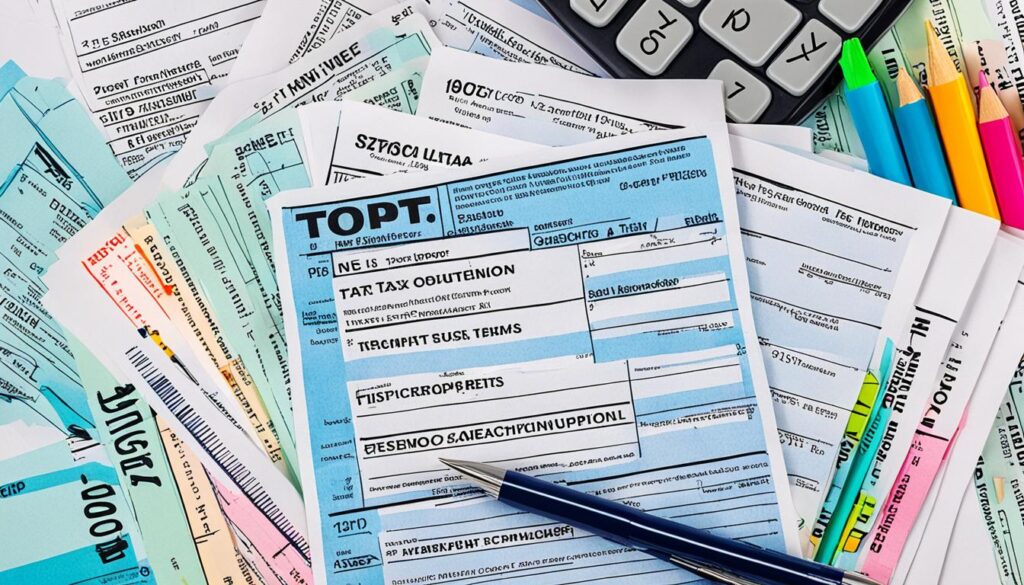
| Key Benefits of Accurate Records and Organized Bookkeeping | Examples of Business Expenses |
|---|---|
| 1. Facilitates accurate reporting and tax filing | Office supplies |
| 2. Provides financial visibility and insights | Travel expenses |
| 3. Helps identify tax deductions to minimize tax liability | Advertising and marketing costs |
| 4. Allows for informed financial decision-making | Professional service fees |
| 5. Ensures compliance with tax laws and regulations | Equipment and machinery purchases |
File Your Taxes Annually and Plan Ahead
Filing your business taxes yearly is key to avoid penalties. It’s important to stick to the deadlines for your type of business. This keeps everything in order.
Planning ahead makes filing taxes easier. It helps prevent mistakes or delays. Adding tax strategies to your business can lower surprises and improve tax outcomes.
Here are a few tips to help you stay on top of your tax filings:
- Set reminders: Use calendar alerts or tax software to set reminders for important tax deadlines.
- Maintain accurate records: Keep detailed and organized records of your business transactions, expenses, and income throughout the year. This will simplify the process when it’s time to file your taxes.
- Consult with a tax professional: Consider seeking advice from a tax expert or accountant who can help you navigate complex tax laws and provide personalized guidance tailored to your business.
- Review tax planning strategies: Regularly review your tax planning strategies to identify potential opportunities for deductions and credits.
- Stay informed: Stay updated with any changes in tax laws or regulations that may affect your business. Subscribe to newsletters or attend seminars/webinars to stay informed.
By using these practices, you can make tax filing easier. You’ll also stay on the right side of the law and meet your tax duties well.
Good tax planning and yearly filings are very important. They keep startups and small businesses stable financially and reduce taxes. So, always make tax planning a key part of your business’s financial planning.
Utilize Professional Help for Tax Filing
Filing business taxes accurately is vital. Missteps can lead to issues with tax laws. If you feel lost or overwhelmed, seeking professional help is wise. A tax professional ensures your taxes are correct, giving you peace of mind.
A tax expert knows how to maximize deductions for your small business. They deeply understand tax laws. They can navigate the tax system to file correctly. If the IRS has questions or audits you, they can also help.
Getting help from a tax pro saves you time and eases stress. It lets you focus on your business while they handle the taxes. This way, you have a trusted expert by your side.